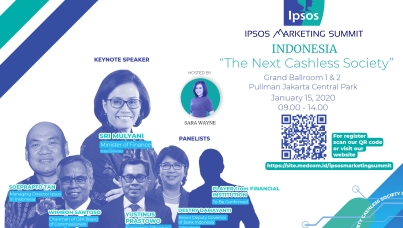Ipsos Update - December 2017
We start with Flair Brazil and a “time for truth” for a country dealing with years of political scandals, government corruption and the omnipresent “fake news”. Written collectively by our local experts, the latest in our series of Ipsos Flair reports finds Brazilians feel “cheated” by the media, politicians and by all those who inform and govern them, with corruption concerning 56% of people there.
Looking at Latin America more widely, the latest edition of the Latin American Opinion Leaders survey presents the annual regional presidential rates of approval. This year, Juan Manuel Santos of Colombia (78%), Mauricio Macri of Argentina (69%), and Michelle Bachelet from Chile (69%) are the LATAM presidents with the highest rates of approval.
Meanwhile, a new white paper argues that we are seeing disruptions today that are shaking up categories like never before, and these disruptions will have a fundamental impact on the way consumers relate to brands. Future-Proof your Brand sets out a four-step approach to help you embrace category disruptions, and use them as an opportunity for growth instead of a threat.
Shifting our attention to shopping, global consumers are reporting seeing fewer traditional “Main Street” businesses, while increasingly resorting to digital and convenience-focused alternatives. The Desertification of “Main Street” finds consumers in China, Britain and Poland are those most likely to report that they shop online more, or as often, as they did three years ago.
Thinking about our working lives, many of us are convinced a workplace revolution is on the way. The World at Work reveals our fears and expectations regarding the future of the workplace, with 80% of employees globally saying we will work differently in 10 years’ time and 61% thinking having multiple jobs simultaneously will become the standard.
Meanwhile, there’s a growing consensus across the world that free trade benefits local economies, according to the latest wave of our annual international affairs study for the Halifax Security Forum. Results show that 84% (up 7% since 2016) of global citizens believe in the benefits of free trade, with support highest in China (96%), Peru (95%), Britain (93%) and Mexico (93%).
Next up we focus specifically on Great Britain, a country portrayed as an increasingly divided place – with splits between the “haves” and the “have nots”, Millennials and Baby Boomers, Brexiteers and Remainers, or the experts and the rest. Reflecting a changing Britain in a changing world is a new report examining the factors that both divide the nation and those that bring it together.
Finally, we examine what makes a great place to live, with a new global study on housing. Diving deeper into the attitudes of Americans, What the Future (WTF) looks at whether citizens think they can age with their home and what incentives should be in place to improve opinions about forthcoming housing developments. Housing is the first topic in the new quarterly WTF series and subsequent issues will feature three other key consumer-spending categories: transportation, healthcare and food.

![[Webinar] One Mind Many Truths: An Ipsos APAC Webinar on Generations](/sites/default/files/styles/list_item_image/public/ct/event/2023-10/MicrosoftTeams-image%20%2810%29_0.png?itok=z8oqhKPD)

